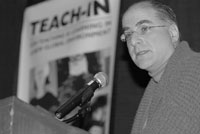|

Teachers
College Holds a Teach-In for Educators
By
Bruce Myint
New
York public school teachers face tough challenges in the wake
of the September 11th attacks. Their task: to help
young people face the complicated issues surrounding 9/11 while
promoting cross cultural awareness and understanding. It is a
difficult undertaking, but at a recent Teach-In, hosted by Teachers
College, Columbia University, roughly 500 school teachers and
administrators from the metropolitan New York area met to do just
that.
“We’re
trying to prepare children for a world that is in flux,” said
Arthur Levine, President of Teachers College, in a speech welcoming
participants to the day-long event.
The Teach-In for Teaching and Learning in a New Global Environment
offered participants an eclectic mix of over 50 small-group workshops
and forums including such topics as: “Designing Curriculum in
Response to September 11th,” “The Impact of 9/11 on
Kindergarten Students,” “Muslims in New York,” and “The Internet
as a Vehicle for Helping Learners to Understand and Respond to
Global Issues.”
The event, organized in only a matter of months by a group of
curriculum and outreach specialists under the leadership of President
Levine, brought participants together with scholars, political
leaders, and experts on teaching and learning in a rapidly changing
global environment.
Keynote speakers included Carol Bellamy, Executive Director of
the United Nations Children’s Fund, Harold O. Levy, Chancellor
of New York City Schools, and middle-school teacher Stacey Fell-Eisenkraft
with members of her 8th grade class.
The need for the Teach-In was urgent. Keynote addresses described
that in the weeks following the attacks students asked questions
that teachers often found difficult to answer. Chancellor Levy
shared heartrending stories of young teachers, some in only their
fifth day of their career, bravely guiding their students out
of the chaos of September 11th.
Carol Bellamy underscored the immediate need for students “to
think about war and political violence in an informed and open–minded
way.”
The Teach-In aimed at helping such teachers and their students
cope with the effects of the attacks by emphasizing suitable content
for a post 9/11 curriculum.
Acknowledging the trauma experienced by both teachers and students,
Barry Rosen, Executive Director of External Affairs at Teachers
College, remarked, “We see this as a community service for the
teachers of the metropolitan area.”
Making matters even more complicated for teachers is the fact
that in order to create a post 9/11 curriculum, they must often
include content not found in typical lesson plans. Topics such
as the role of women in Islamic societies, globalism, and human
and civil rights may be unfamiliar but are nevertheless crucial.
“Schools can teach intolerance and anger just as they teach diversity
and freedom,” said Chancellor Levy. “We need to be cognizant of
both.”
Such complex curricular changes involve a long-term commitment.
However, it is one that is well suited to the educators who play
a vital role in helping the metropolitan area on its road to recovery.
Says President Levine, “I don’t know any slower way to change
the world than education. But I also don’t know a more effective
way.”
Although many workshops focused on curriculum design, the Teach-In
also included a panel discussion on civil liberties and human
rights during war time. Panelists included Maxine Greene, Professor
Emeritus of Philosophy and Education at Teachers College, Ira
Glasser, former Executive Director of the ACLU, Norman Siegel,
former Executive Director of the New York Civil Liberties Union,
and Anne Nelson, Director of the International Program at Columbia
University’s School of Journalism. Darlyne Baily, Vice President
for Academic Affairs and Dean at Teachers College, moderated the
discussion.
Organizers of the Teach-In are planning a summit that will be
held later this year on developing curriculum materials that will
include experts in the field.#
Bruce
Myint is an intern at Education Update and a doctoral candidate
at Teachers College.
Education Update, Inc., P.O. Box 20005, New York, NY 10001. Tel:
(212) 481-5519. Fax: (212) 481-3919. Email: ednews1@aol.com.
All material is copyrighted and may not be printed without express consent of
the publisher. © 2001.
|

